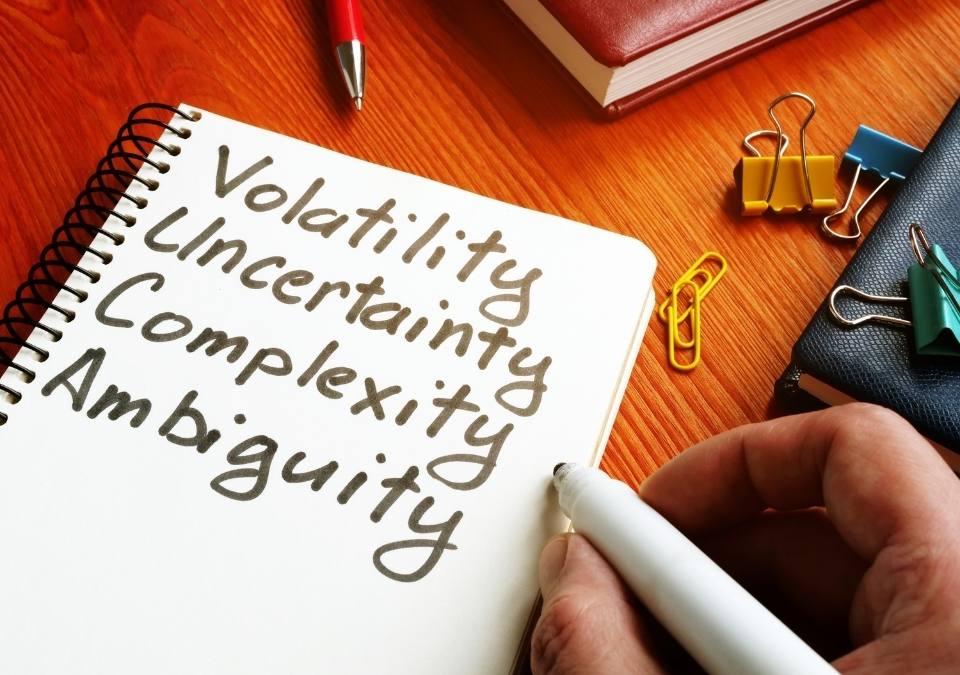I was fortunate a couple of weeks ago to have the opportunity to invest in my own professional development and participate in an online session with Professor Bill George (senior fellow at Harvard Business School, former CEO of Medtronic and the author of: Discover Your True North and The Discover Your True North Fieldbook, Authentic Leadership, True North, Finding Your True North, 7 Lessons for Leading in Crisis and True North Groups).
Of the many pearls of wisdom shared during the session, I was particularly interested in Professor George’s perspective on being an authentic leader in a VUCA World.
So what is a VUCA World?
Most would I am sure agree that the world we live and work in today is somewhat different to the world as it existed say 20, 30 and certainly 50 years ago. Apart from the obvious technological, social and political changes we’ve seen, the environment in which our businesses/organisations operate has changed significantly.
The acronym VUCA, first coined by leadership theorists Warren Bennis and Burt Nanus in 1987, was an effort to better define the changing nature of the world. Briefly;
V = Volatility: change is a constant in the modern world and it happens quickly.
U = Uncertainty: we can’t depend or rely on things being the way they always have been, the world has become increasingly less predictable.
C = Complexity: with technological advancements and globalisation, pretty much everything is related or interconnected with everything else. Changing one thing impacts another, or many things.
A = Ambiguity: increasing volatility, uncertainty and complexity means the answers to issues and problems perhaps aren’t as clear as they may have been in the past.
Since its rise to prominence in the early 2000s, commentators have used VUCA as a framework of sorts, to consider how organisations need to position themselves and plan for their future success.
Authentic Leadership in a VUCA World
Professor George’s perspective in relation to leadership is that leaders in a VUCA World need to themselves develop and apply certain qualities in order to help their organisations survive and thrive in the constantly evolving environment. In short, a VUCA World requires leaders to have a set of leadership qualities he refers to as VUCA 2.0:
Vision – With the volatility, uncertainty, complexity and ambiguity of the modern world, people are more than ever looking to their leaders for a sense of Vision. To respond to the big questions and provide a guiding light: where are we going as an organisation? what’s driving us? what values define us? what difference are we striving to make?, and how are we going to get there? Professor George refers to this as an organisation finding its “True North”.
Understanding – Having established a firm Vision, leaders need to constantly be gathering current information from multiple sources in order to see things from multiple perspectives and ultimately determine the most appropriate response to challenges and opportunities in the ever-changing environment. How do things appear from multiple perspectives (staff, customers/clients, other stakeholders)? Leaders also need to have a solid and realistic understanding of the current capabilities of their organisation, their team and themselves, to plan effectively for the selected response.
Courage – Taking advantage of the opportunities and effectively meeting the challenges of a VUCA World regularly requires courageous leadership. Leadership that digs out and directly faces challenges rather than ignoring or avoiding them in some unrealistic hope that they will just disappear. Leadership that keeps the long-term vision in mind, and that potentially requires decisions that may be subject to questioning or even a bit of short-term pain. While leaders need to understand, seek and consider different perspectives, they also ultimately need to be prepared to make difficult decisions.
Adaptability – Operating within and responding effectively to a rapidly changing environment requires leaders who are comfortable and able to flex and adapt (or dare we say “pivot”). While we need to continue to recognise the importance of effective planning processes, we need to recognise that the changing world demands that where possible we keep more options open for longer, that we place more importance on contingency planning and that we ramp up efforts to quickly identify any changes to the environment, then come to understand understand potential implications of the changed environment and recalibrate our plans.
With external volatility the prevalent characteristic these days, business leaders who stay focused on their mission and values and have the courage to deploy bold strategies building on their strengths will be the winners. Those who abandon core values or lock themselves into fixed positions and fail to adapt will wind up the losers.
Professor Bill George
Professor George’s VUCA 2.0 commentary in my view raises some important questions worth pondering for those of us leading organisations in these volatile, uncertain, complex and ambiguous times:
- How clear is the Vision in your business/organisation?
- What do you do/could you do more of to better Understand the dynamic environment in which your business/organisation operates?
- Do you have leaders in the business/organisation prepared to make Courageous, bold decisions when required?
- Are your strategic and operating plans Adaptable? Do you have contingencies in place and mechanisms to quickly respond to a changing environment if required?
Perhaps ask yourself: How has your leadership changed to meet the demands of a VUCA World?

